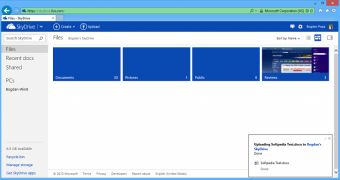Microsoft has recently been criticized for its involvement in the PRISM saga, with some voices close to the matter suggesting that the tech giant has provided US intelligence agencies with unlimited access to user accounts.
That’s not the case, SkyDrive team members Omar Shahine and Mona Akmal explained in an Ask Me Anything session on Reddit, as the tech giant has absolutely no interest in the files you’re storing in the cloud.
They did admit, however, that all files saved in SkyDrive accounts are automatically scanned for offensive adult material, as the company is trying to keep consumers away from sharing online content that infringes its ToS.
“We don’t really have any interest in what’s in your private files. The only exception here is where we’ve stated what we have a zero tolerance policy for child exploitation and we proactively scan for content uploaded to SkyDrive using technology called PhotoDNA,” they wrote.
“However, when you share your private files on the web, we do have an interest in making sure that the content you are sharing is not offensive in nature to the public at large. So we have mechanisms for people to ‘Report Abuse’ in which case we’ll review the content and ensure it’s not offensive.”
Microsoft has always claimed that it did not share user details with intelligence agencies unless it’s asked to, claiming that all files stored in the cloud are encrypted.
“If a government wants customer data – including for national security purposes – it needs to follow applicable legal process, meaning it must serve us with a court order for content or subpoena for account information,” Brad Smith, general counsel & executive vice president, Legal & Corporate Affairs, Microsoft, explained recently.
Microsoft has even asked the Attorney General of the United States to grant permission to the Redmond-based tech giant to share details on national security requests for customer information, in an attempt to demonstrate that the company never shares details without being asked to.

 14 DAY TRIAL //
14 DAY TRIAL //